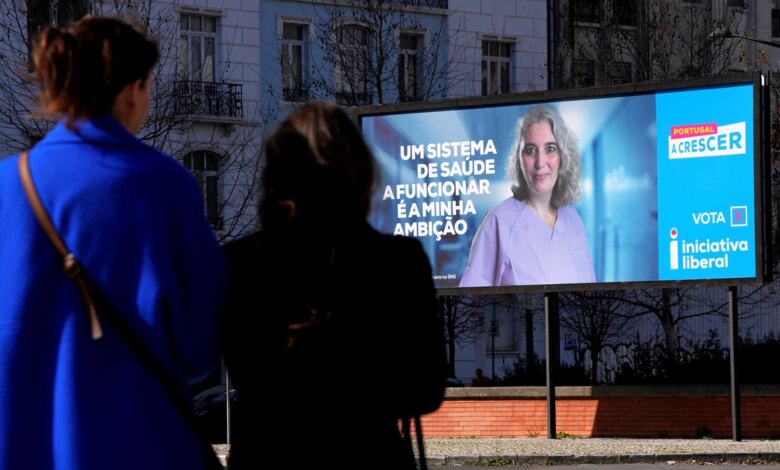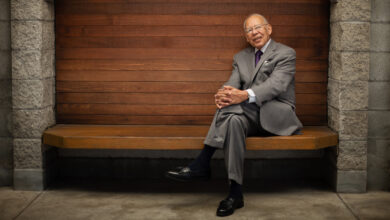Brazilian Evangelicals Bring Their Political Play…

As Portugal goes to the polls this Sunday, a transatlantic group of Christian leaders has come together to campaign for the National Democratic Alternative (ADN).
Founded in 2014, the small party has never held a seat in the Assembleia da República, Portugal’s parliament, and has drawn national attention for downplaying COVID-19 and blaming the US for the war in Ukraine. But its pro-life, religious liberty, and anti-drug legalization stances have drawn significant evangelical support, much of it coming from Brazilian immigrants and nationals who are eager to bring their political playbook against their former colonizer.
“I want to call on all evangelical leaders in Portugal, as well as all Christians, to support and vote for the ADN in the elections on March 10,” said Brazilian representative and Pentecostal pastor Marco Feliciano in a YouTube video by ADN adherents several weeks ago. “It’s time for people who love the Holy Bible to arise and to make a decision for a better country, a country that protects and promotes Jewish-Christian values.”
Feliciano is one of numerous Brazilian lawmakers who have made their evangelical identity integral to their politics. The founder of Catedral do Avivamento, a neo-charismatic church loosely affiliated with the Assemblies of God, he makes up one of 204 deputies (out of the 513 in the lower house of the Brazilian parliament) in the evangelical caucus Evangelical Parliamentary Front.
This coalition supports keeping abortion and drugs illegal and backs other issues that are important to the evangelical public. Not all in the group profess the evangelical faith; about half are there to signal these stances to their constituents. Though the bloc has been criticized for giving unconditional support to former president Jair Bolsonaro and does not have unanimous support even among evangelicals, its members largely continue to win their elections and pick up new supporters.
“On the subjects that are more valuable to Christians, our group has done a very precise job,” Feliciano told CT in a written statement. This success has encouraged many to set their sights on places where the diaspora might have political influence.
Under a 1971 agreement, Brazilian and Portuguese immigrants to either country can receive nearly all of the same political rights as nationals, including voting in national elections. In particular, many evangelicals in both countries now want to start their own evangelical parliamentary coalition. For them, the first step is voting for the ADN.
Valdinei Ferreira, sociologist and professor at the College of Theology of the Independent Presbyterian Church of São Paulo, sees this phenomenon as a “natural development” of the Brazilian presence in Portugal.
“Brazil has created its own infrastructure of evangelical institutions. As a result, if you have an intense presence of Brazilians, it is natural that they will try to reproduce their systems,” he says. “This political ramification ends up being a side effect.”
A scholar of the transnationalization of Brazilian churches, Ferreira observes that “this conversion of religious identity into a political identity is relatively new in the Brazilian context.”
“One of the first evangelical deputies elected in Brazil was Lauro Monteiro da Cruz in the 1950s,” Ferreira recalls. “He was elected based on his career as a doctor. His religious identity was not taken as something that could benefit his credentials. Today, however, people present themselves as ‘evangelicals,’ and that’s enough to run in the elections.”
As Brazilians move abroad, they take these practices with them. “This model of the evangelical bloc makes alliances with other faces of political conservatism, which has become a transnational issue,” says Ferreira.
One percent
Portuguese generally hold parliamentary elections every four years, but this year’s snap elections follow the abrupt departure of Prime Minister António Costa, who resigned over corruption allegations against two of his ministers.
If the ADN receives 1 percent of the vote, it will probably be represented by a member of parliament (MP) for the first time. In the 2022 parliamentary election, the party garnered 10,911 votes, or 0.2 percent of the country’s total voters. (The party would have needed 70,000 votes to earn a representative then.)
This year a slightly different scenario may be shaping up. A voter panel conducted by CNN Portugal suggested that the ADN would earn 1 percent of the vote, a swing possibly explained by the efforts of nearly two dozen local pastors, all either Brazilian or with close connections to Brazil.
Paulo Nunes, who pastors Assembleia de Deus Missão Lusitana, coordinates the group. Born in Torres Novas, a town 70 miles north of Lisbon, he moved back to Portugal in 2021 after 30 years in Switzerland.
Nunes became a Christian in Zurich and started attending a Portuguese-speaking Assembly of God church, which was led by Brazilians and affiliated with one of the main branches of the Assemblies of God in Brazil, the Ministério Belém (based in São Paulo). He became ordained in 1996.
Nunes admits that, until recently, he knew very little about Portuguese politics.
“I was familiar with and in touch with Brazilian politics. I heard about what was happening in Portugal, but I was more informed about the Brazilian reality,” he says. “Brazilians have the determination to fight for their principles, for what they believe in.”
But other Portuguese evangelicals don’t find this model of political engagement as compelling.
On February 20, the Aliança Evangélica Portuguesa (AEP) issued a statement advising Christians to exercise their right to vote but also warning them to avoid turning churches into a stage for electoral campaigns.
“Genuine participation should not be used to manipulate religious and spiritual communities and organizations,” the evangelical group stated, “nor should the pulpit be utilized to rally support for the specific political agendas of a party.”
The AEP sent another document to member churches, addressing a video that brought up the alliance in the context of a meeting between religious leaders and officials of the ADN.
“On this matter, I must clarify that, having been invited to attend the aforementioned event as president of the AEP, my absence was not due to any unavailability or scheduling conflict,” wrote Timóteo Cavaco, “but rather to the clear and resolute conviction and understanding that the AEP cannot be associated with this action or any other of a political-party nature.”
Cavaco was approached by CT to comment on both documents, but he declined and stated that the organization would only address the issue after the March 10 vote.
But Nunes—who is on the ADN’s party list and can become an MP if the group achieves a place in parliament—says that the vote of Brazilian evangelical immigrants can help change the country for good.
“The evangelical parliamentary bloc will be a driving force,” he says.
Feliciano sent a written statement to CT saying that he recorded the video to address issues such as religious freedom, the decriminalization of drugs, and abortion. “In the absence of legislators that act as opposition to these matters, they have been approved in disregard of what the conservative part of society thinks. Portugal needs conservative representatives in the legislature.”
Egypt and the people of Israel?
Demographic changes may ultimately limit the AEP’s influence on Portugal’s evangelical church. According to Portugal’s 2021 census, there are 187,000 evangelicals in the country, or 2.1 percent of the population above 15 years old (the total population is 10.3 million). This is more than twice as much as 2011, when the evangelical population was 75,000, or 0.8 percent of the population.
This growth is largely attributed to immigration—a report from last year reveals that there are 781,000 foreigners living in Portugal, a contingent that has been steadily increasing over the past seven years. Of these, nearly 30 percent are Brazilians. To put it another way, nearly 4 in 10 Brazilians living in the country are now evangelicals.
In a predominantly Catholic country, however, the very presence of foreigners in evangelical churches may seem suspicious. In recent years, there have been scandals involving church leaders in illegal adoptions of babies and immigration issues.
Antonio Rodolpho moved to Portugal from Brazil as a missionary nearly 30 years ago. He has held workshops in several churches across the country to help leaders deal with an increasingly multicultural environment, including Brazilians as well as citizens from Portuguese-speaking countries in Africa (Cabo Verde, São Tomé and Príncipe, Guinea-Bissau, Angola, and Mozambique).
“Some churches were about to die but were revived with the arrival of immigrants,” he said.
But sometimes it doesn’t go so smoothly. Rodolpho compares the relationship of Brazilian churchgoers and their Portuguese counterparts to Egypt and the rapidly growing people of Israel in Exodus 1—the community grew so quickly that their hosts began to worry there might be a takeover of power.
“When there are one or two Brazilian families, it’s beautiful, exotic,” he said. “When this group grows, however, then comes the fear—what if they take over the church?”
This is not a concern for many church leaders. Joel Resende, a Portuguese pastor in the Wesleyan Methodist Church at Gafanha de Nazaré, a fishing community 160 miles north of Lisbon, says that in his community, there is an average attendance of 100 people per service—40 Portuguese, 30 Brazilians, and 30 Bissau-Guineans. It’s better this way, he says, “than to have a Portuguese-only church with barely 40 people.”
For now, even with the support of Brazilian immigrants, the chances of an evangelical bloc taking hold of the Portuguese political space are very slim. However, professor Ferreira warns that the mobilization factor within churches could give greater weight to the evangelical vote.
Since voting is not mandatory in Portugal, a surge of support called for by religious leaders could lead to higher voter turnout and favor a group presenting itself as an outsider in politics.
“Even if they are not numerically strong, they can still cause a lot of fuss.”




